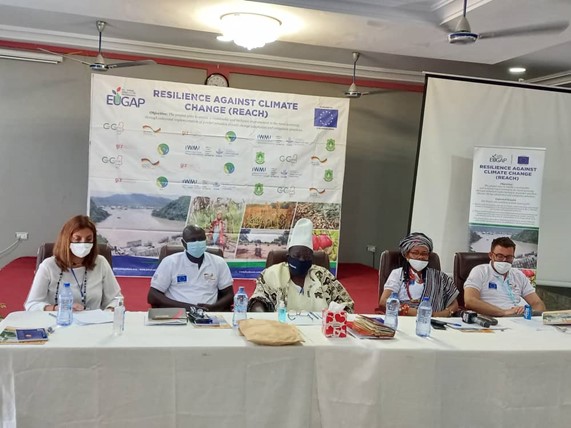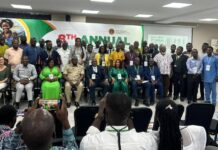EU Resilience Against Climate Change (EU-REACH), on 13 October, kicked-off a 2-day workshop in Wa, Upper West Region, to share results of a socio-economic and gender baseline survey with stakeholders and partners.
The baseline results emphasized the status of social, economic, and gender aspects of the project area at the inception of REACH interventions. These findings will help inform the communities to be identified for specific development interventions for the REACH Project and provide the basis for monitoring progress and evaluating the effectiveness and impact of the interventions in the Project area.
Among other things the results revealed that the youth have very limited access to land and demonstrated that women were disadvantaged in terms of education levels, income levels, social capital, access to extension, access to assets, and control of the different assets and benefits coming from farming. These findings will inform planning and offer a strong basis for targeted and inclusive interventions to cater to women, youth, and vulnerable groups.
The workshop provided a platform for 56 participants comprising relevant Policy Makers, Traditional Authority, District and Regional Directors of Agriculture, Planning Officers, Representatives of Private Institutions and Non-Governmental Organizations to deliberate extensively and collectively, determine how best to ensure that REACH supports are gendered and consider the different interests of women, men, youth, children and people with disabilities to ensure an equitable improvement in the livelihood of all.
In his address at the opening of the workshop, Team Leader for the REACH project, Florian Johannes Winckler noted that “Since the inception of the project, we have been engaging stakeholders on a more sustainable way of building resilience to the menace of climate change from an institutional, communal and individual household level. These engagements in our estimation have been fruitful thus far and would continue to ensure a more concerted approach to implementing the project”.
“This workshop will find synergies that will help us fine-tune our activities to ensure an effective and a coordinated implementation of the REACH project,” he said.
Resilience Against Climate Change is an EU supported project that commenced in January 2019 and will run until the end of 2024. The project is being implemented by the Competitive Cashew Initiative (GIZ-ComCashew) and the International Water Management Institute, in close collaboration with the Ministry of Agriculture.
About REACH:
The EU’s Ghana National Indicative Programme, 2014-2020 (Sector 2: Productive investments in agriculture) fully supports and contributes to the initiatives in the North-West Savannah zone through its “Productive investments for agriculture in the Northern Savannahs ecological zone Programme” comprising three interlinked components.
The EU-funded REACH Project which commenced in January 2019, is one of the three components. REACH itself, also has 3 components:
i) Provision of assistance to district planning teams to develop climate-smart development plans contributing to the Nationally Determined Contributions (NDCs) of the Paris Climate Agreement.
ii) Improving community and individual knowledge and practices in conservation agriculture (CA) through land-use mapping and the development of Community Action Plans (CAPs).
iii) Research into the impacts of climate change on social transformation to inform future planning decisions
Components i and ii are implemented by the Competitive Cashew Initiative (GIZ ComCashew), whereas component iii is managed by the International Water Management Institute (IWMI). All three components are implemented in close partnership and collaboration with the Ministry of Food and Agriculture. The programme will run until the end of 2024. For more information please visit: www.comcashew.org / http://www.a4sd.net
About International Water Management Institute:
International Water Management Institute (IWMI) in collaboration with CSIR-STEPRI, UG, and UDS is implementing the Social Transformation Research component; that seeks to address the impact of climate, migration, gender, and youth on social transformation in Ghana. IWMI is a non- profit, scientific research organization focusing on the sustainable use of water and land resources in developing countries. Its research in Ghana has encompassed the three thematic areas of strengthening rural-urban linkages, promoting sustainable growth, and building resilience.
About GIZ:
As a provider of international cooperation services for sustainable development and international education work, GIZ is dedicated to building a future worth living around the world. GIZ has over 50 years of experience in a wide variety of areas, including economic development and employment, energy, and the environment, and peace and security.
The diverse expertise of our federal enterprise is in demand around the globe, with the German Government, European Union institutions, the United Nations, the private sector, and governments of other countries all benefiting from our services. We work with businesses, civil society actors, and research institutions, fostering successful interaction between development policy and other policy fields and areas of activity. The German Federal Ministry for Economic Cooperation and Development (BMZ) is our main commissioning party.
Currently, GIZ promotes sustainable development in Ghana via about 50 programmes and projects. Our activities currently cover four priority areas: Economic Development, Agriculture, Governance, and Renewable Energy, and Energy Efficiency. Additionally, our portfolio extends to other areas such as the environment, peace, and security. Another focus of GIZ’s work is linking business interests with development-policy goals. Most of the programmes and projects we support in Ghana have successfully brought together national and international private companies, the public sector, and civil society groups to collaborate on development initiatives.








